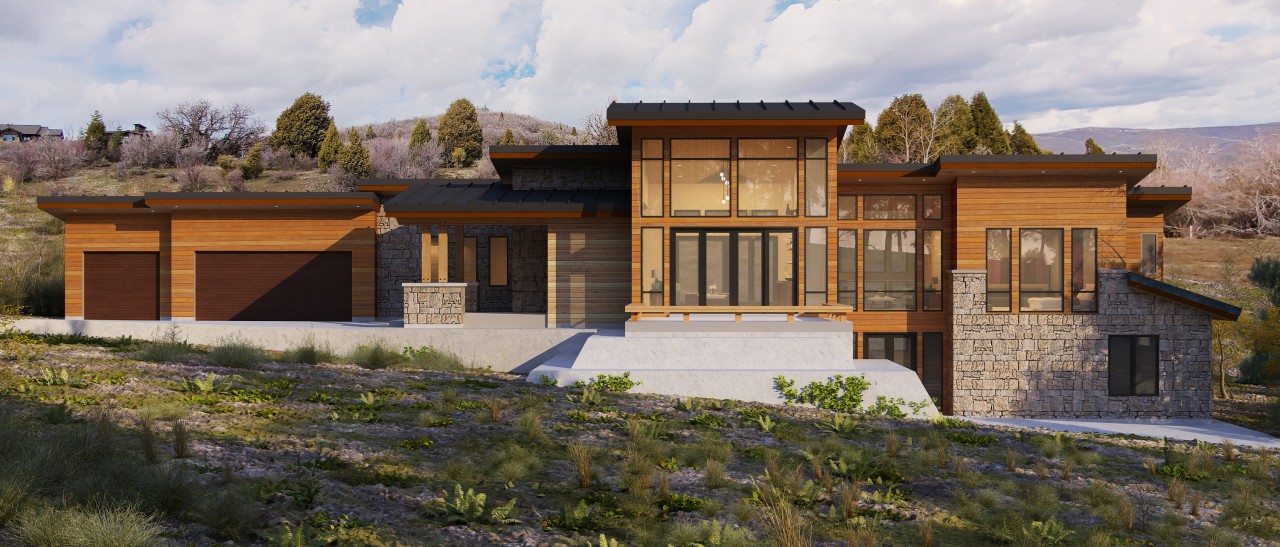The supremacy of the 3D graphic designing and rendering domain is yet to be capitalized thoroughly. The days of depending simply on 2D images or physical drawings to represent the architectural design and selling propositions of construction sites are long gone.
Realtors can use 3D exterior rendering to offer potential consumers with a realistic representation of the final outcome. This level of visual engagement not only enhances the presentation of properties but also fosters consumer trust, allowing them to visualize architectural designs and make well-informed decisions.
Understanding 3D Exterior Renderings
Exterior rendering is a technique for creating photo realistic and accurate visual representations of the exterior facades and urban environments of houses, hotels, resorts, commercial spaces, or entire downtown areas. 3D exterior renderings are created by using modern rendering tools and techniques to produce realistic pictures and animations that accurately showcase every detail of the exterior of a building in its real-world environment.
Why Should Architects & Realtors Consider 3D Exterior Rendering?
1. Virtual reality and 3D exterior
rendering methods are widely employed in the architectural, real estate, urban planning, and property development sectors. They provide clients with immersive experiences that allow them to better understand and interact with architectural concepts before they are built. Here are some of the most significant impacts that exterior rendering have on architectural visualizations:
2. 3D Visualization for Unbuilt Projects
VR and 3D exterior renderings are useful tools for visualizing and expressing the architectural design ideas to potential clients in the concept phase itself. This allows clients to make decisions based on the most realistic representation of the project.
3. Remote Presentations
Architects and designers can remotely exhibit their plans to customers and stakeholders using VR and 3D visuals. This aspect is extremely beneficial when working with clients from different places or when traveling is a constraint.
4. Cost and Time Savings
Builders can discover and solve flaws or difficulties before construction begins by using 3D exterior rendering early in the design phase. This early detection helps in avoiding costly modifications during the building process, thereby saving time and resources.
5. Customization and Flexibility
Through virtual reality experiences, 3D exterior rendering supports ease in customization of design features like materials, colors, and landscape. This adaptability helps in catering to customer preferences and specific project objectives, ensuring that the design matches client’s specific wants and demands.
Designing Exterior Rendering Strategies in Real-Time
To optimize the impact and efficiency of 3D exterior renderings, proper planning and execution are required. The following are the top three strategies for successful implementation of virtual reality and 3D exterior rendering techniques:
High-Quality Visual Content
Developers must invest in expert 3D rendering services that provide photo realistic and detailed representations of the properties\’ architectural design, landscape, lighting, and urban environments.
Multi-channel Marketing Campaign
Developers should make rendering services available through multiple channels, such as the property website, social media, as well as email newsletters.
Interactive Virtual Tours
Implement interactive virtual tours that allow potential buyers to experience the property in immersive ways. This gives buyers a sense of control and provides an in-depth understanding of the property.
Final Words
Leveraging virtual reality and 3D exterior rendering experiences is essential for realtors because it provides greater visual representation, higher buyer engagement, cost and time savings, and other benefits. Architects and professionals can stand out from competition, boost sales, and keep their clients satisfied by employing this technology to create immersive experiences that appeal to buyers.

